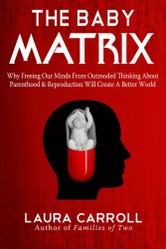This book has been on my to-read list for some time, and I came into it with high expectations based on its description and reviews from others. I am a woman affected by infertility, who has chosen at this time (due to reasons including but not limited to my age, the expenses involved, and high uncertainty of success) not to pursue alternative family building options such as fertility treatments or adoption. It has not been an easy decision to make, nor has been easy to deal with the pressure and judgement from others on my decision. As a result of my situation I have become acutely aware of the biases in how parents versus the childless/childfree are treated, regarded, and accepted in their communities, workplaces, and even by their closest family members.
So I came in to this book hoping to find a text that would not just echo the things I already had experienced and knew, but would perhaps give me additional strength - and further ammunition - in dealing with our pronatalist world. Perhaps that was a bit of my problem from the start; I did not need convincing that our world operates with a pronatalist bias; I wanted more in-depth discussion of why this is the case, and how we can actively go about changing things and bringing acceptance.
In the opening chapter of The Baby Matrix, Carroll gives a very brief overview of why encouraging high-birth rates was so important in the past and why natalism was encouraged or valued through the evolution of society: disease and high mortality rates meant lots of children needed to be born to keep cities and indeed empires thriving; religions needed to encourage family growth in order to gain more followers; settlers in the New World needed to have many children in order to help with farm labor. Big business, too, likes to see lots of babies being born as that means more consumer goods to be purchased in the future. This is no great surprise or revelation - nor anything that can't already be found on a basic wikipedia page about natalism.
Carroll mentions how pronatalist messages dominate our entertainment media, which is also true, but she gives very few specific examples which would help make the case, especially for those readers who might not be specifically aware of it and the insidiousness of this message.
The Baby Matrix then presents a chapter each dedicated to seven "assumptions" made in our pronatalist society and how they affect our lives and expectations. Carroll suggest an "alternative assumption" for each which is supposed to be the post-pronatalist worldview to be encouraged. For instance, there is "The Fulfillment Assumption": the widespread belief that "The ultimate path to fulfillment in life is parenthood" and that those who do not become parents will never lead a truly full and satisfying life. The author's alternative is to suggest instead that "Parenthood is one path to purpose and fulfilment in life", but not the only one and not the right one for all individuals. This is actually one of the strongest chapters in the book, in my opinion, as she discusses how many jump into parenthood assuming it will fill a void in their lives, but then discover that it is not a magic pill for happiness and satisfaction; indeed, many will admit later in life that if given a choice to go back in time, they would have chosen not to have children after all.
Other chapters tackle assumptions and myths such as "The Elderhood Assumption", that we need to have children in order to be happy and well-cared for in our old age. The author does a good job in this chapter of exposing the myths behind this assumption, especially in the modern day when we cannot assume children will live near us when we are older, want to or even be capable of providing full time care for their parents. She is spot on that we need to each make it our responsibility to plan for our elderhood support structure, housing and health care whether or not we have offspring.
I did have some problems with Chapter 5 in this book, focusing on "The Right to Reproduce Assumption". The author begins talking of how parenthood should be treated as a "Privileged right, not an automatic right" - a statement that is sure to anger, shock and turn off quite a few readers whether they are parents or not. Yes, it is true that many people have children they are not emotionally, mentally or financially able to take care of properly. But when women have had to fight so long, and so hard, and are still fighting to have the right to terminate unwanted pregnancies and have access to birth control methods, should we be encouraging the other extreme of, as Carroll would suggest, "licensing" people for parenthood, before allowing them to give birth/keep a child? Should we be financially penalizing those who have more than one child, and even forcibly sterilize those who have committed abuse or been deemed unfit parents?
I find those ideas too radical and extreme, and frankly rather terrifying. Has Carroll not examined the horrible results of China's "one child" policy, and how that has lead to rampant female infanticide, imprisonment of women who refuse to comply, and other horrors such as were exposed in the 1995 documentary The Dying Rooms? Perhaps instead of regulating parenthood, we should be focusing on improving the laws and systems in place to make adoption easier and a more available alternative once again, improving education and access to birth control for young men and women, and better counseling and support to those parents (and children) under stress and in need of help.
The book's final chapters look at how we can move toward a more "post-pronatalist" world, including how to answer questions and deal with awkward situations that can arise when one is childless and childfree. While I did appreciate her suggestions for dealing with nosy relatives and friends, I'm not interested in being just as nosy and meddlesome as she suggests, turning the questions around on others as to why they have children, why they didn't adopt, why they choose to contribute to "overpopulation", etc. I rather wish we'd all learn to just accept and not judge each other based on our reproductive choices and situations in life. To me, that is what a truly "post-pronatalist" world would look like.







 A Potentially Fatal Accident in the Homeon 11/24/2018
A Potentially Fatal Accident in the Homeon 11/24/2018
 Windsurfing Lessons on Montserrat: One of My Funniest—and Fondest—Travel Memorieson 11/20/2018
Windsurfing Lessons on Montserrat: One of My Funniest—and Fondest—Travel Memorieson 11/20/2018
 Christmas Ornaments Celebrating Rome, Italyon 11/12/2018
Christmas Ornaments Celebrating Rome, Italyon 11/12/2018
 Philadelphia-Themed Christmas Ornamentson 11/09/2018
Philadelphia-Themed Christmas Ornamentson 11/09/2018



Comments